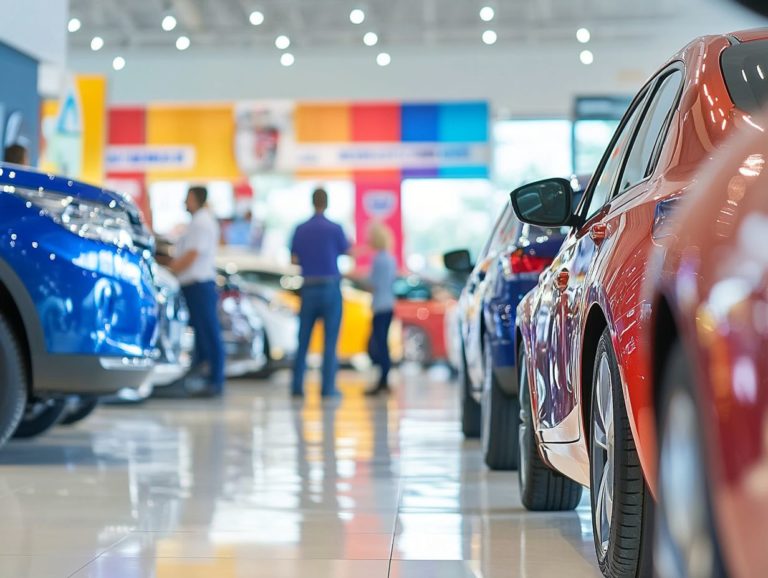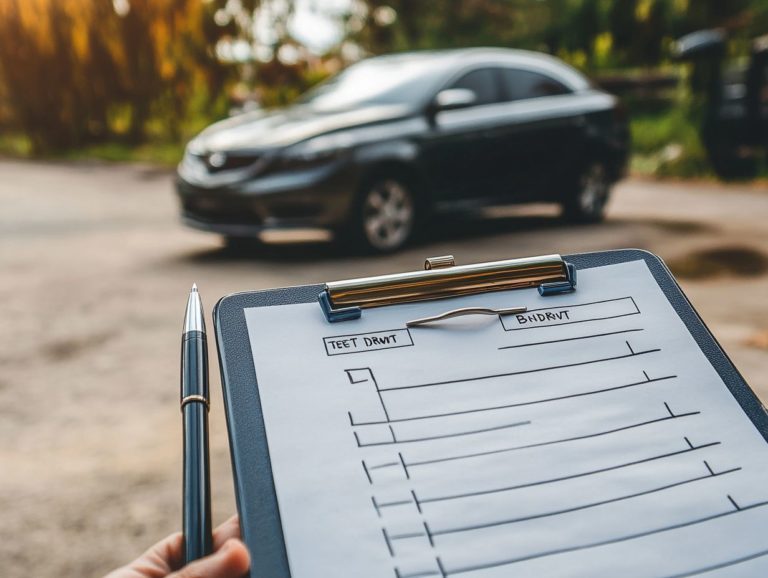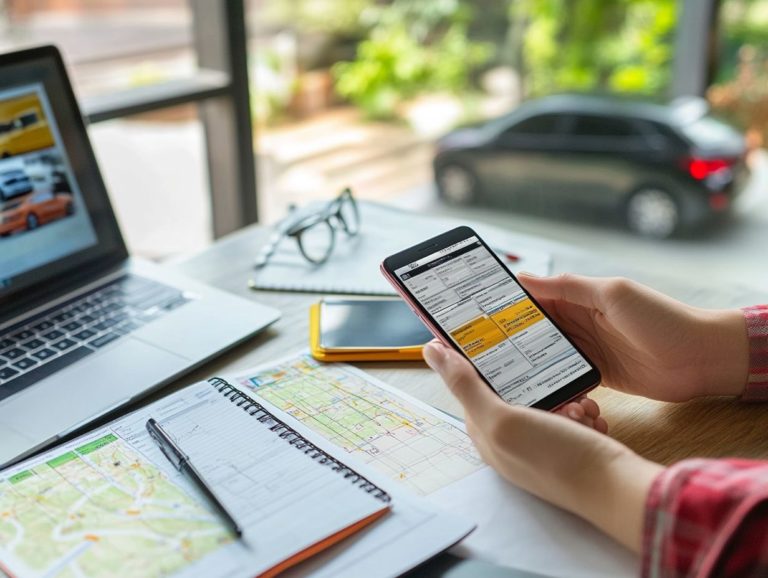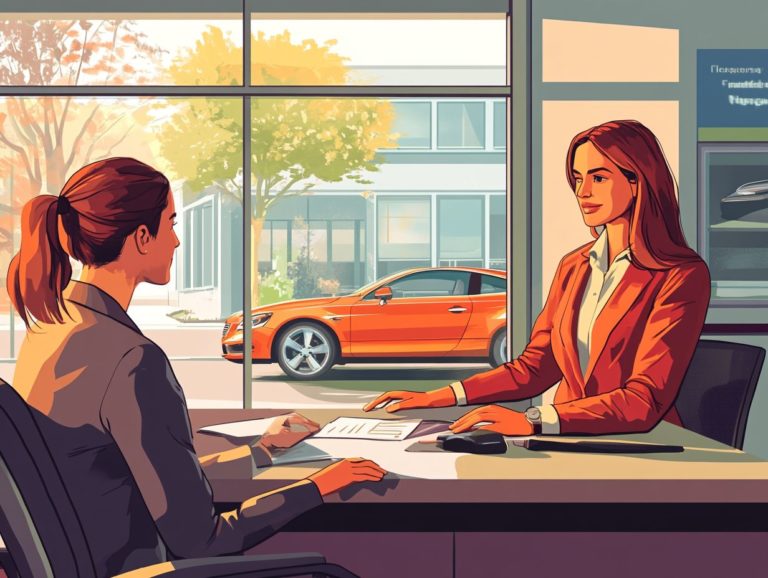How to Choose Between Leasing and Buying
Deciding whether to lease or buy is a pivotal choice that can significantly impact both individuals and businesses. Each option carries its own distinct advantages and drawbacks, shaping your financial stability, lifestyle, and long-term aspirations.
In this article, you ll find a comprehensive breakdown of the fundamentals of leasing and buying, examining the pros and cons of each. Key factors will be discussed to guide you through this important decision, helping you assess your needs and priorities to identify the best fit for your unique situation.
Contents
- Key Takeaways:
- Pros and Cons of Leasing
- Pros and Cons of Buying
- Disadvantages of Buying
- Factors to Consider When Choosing Between Leasing and Buying
- Making the Decision: Leasing vs. Buying
- Frequently Asked Questions
- What is the difference between leasing and buying a vehicle?
- What are the advantages of leasing a car?
- What are the benefits of buying a car?
- How do I determine if leasing or buying is the right option for me?
- Are there any additional costs associated with leasing or buying a car?
- Can I negotiate the terms of a lease or purchase?
Key Takeaways:
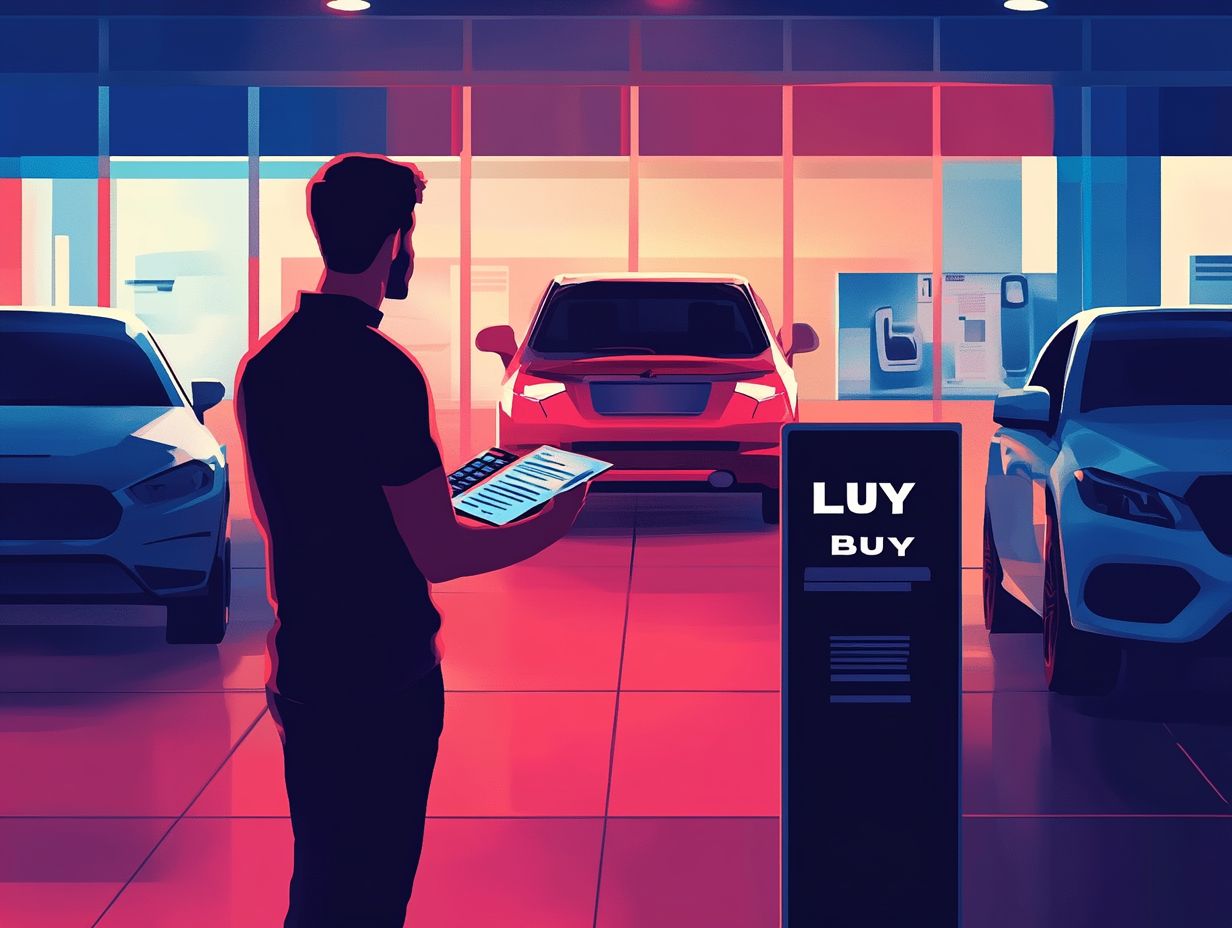
- Leasing may offer lower monthly payments and the ability to upgrade to a new vehicle every few years.
- Buying gives you ownership and the freedom to customize your vehicle, but also requires a larger down payment and higher monthly payments.
- Think about your finances, lifestyle, and priorities to make the best choice.
What is Leasing?
Leasing is a savvy financial arrangement that allows you to enjoy the experience of driving a vehicle without the burden of outright ownership. Typically, you ll find that monthly payments are lower than if you were to buy a car, all while gaining access to the latest models without the long-term commitment that comes with ownership.
A lease agreement governs this setup, clearly outlining terms like vehicle condition, end-of-lease fees, and mileage limits. This makes it an appealing option for those who value flexibility and budget management.
If you crave the newest automotive technology and features, leasing could be your ideal solution. It often demands a smaller initial cash outlay than purchasing. The lower monthly payments associated with leasing can free up your funds for other expenses, making it particularly attractive for the budget-conscious individual.
If you use the vehicle for business, those lease payments may even be tax-deductible, enhancing its financial appeal.
Remember, the way a vehicle depreciates can significantly impact your decision. Leased vehicles generally remain under warranty and tend to hold better residual value. This means you won t be hit as hard by the rapid depreciation that often plagues ownership, allowing you to drive with peace of mind.
What is Buying?
Purchasing a car means you re either buying it outright or financing it through an auto loan, granting you full ownership and the chance to build equity the value of your car that you own outright over time. This is in stark contrast to leasing, which doesn t contribute to ownership equity.
When making this financial decision, consider factors like down payment, trade-in value, and long-term costs. Buying is a more viable choice for anyone planning to keep their vehicle for several years.
When you choose to buy a car, you gain complete control over modifications and customizations. This flexibility fosters a sense of ownership that leasing simply can t rival.
As you pay off the car, you ll notice the potential for increasing trade-in values, making future purchases even more financially advantageous. Building equity not only transforms the car into an asset but also positions it as a financial stepping stone, opening doors for beneficial financing options down the road.
Pros and Cons of Leasing
When contemplating leasing, you must carefully evaluate its benefits alongside its disadvantages. Pay particular attention to factors such as monthly payments, financial implications, and the overall cost structure linked to leasing agreements.
Leasing presents advantages like lower initial payments and reduced responsibility for depreciation costs. However, there are notable drawbacks, such as mileage limits and the absence of ownership equity. This makes it a pivotal financial decision for anyone considering their driving options.
Advantages of Leasing
Leasing a vehicle offers several notable advantages that you might find appealing. For starters, you ll typically enjoy lower monthly payments compared to auto loans, allowing you to drive a more luxurious car or a brand-new model without feeling the financial strain.
Plus, leasing often includes warranty coverage, which means your maintenance costs stay low, giving you peace of mind throughout the lease term. Imagine driving a brand-new model every few years without the worries of long-term ownership!
When you choose to lease, you gain the flexibility to drive a newer vehicle every few years, effortlessly keeping pace with the latest technology and features. This option is particularly attractive if you relish the excitement of driving the latest models and prefer to sidestep concerns about loss in value of the car.
Leasing arrangements often have lower upfront costs, making it a more budget-friendly choice for many drivers. In essence, leasing presents a pragmatic solution that beautifully combines financial ease with the pure joy of driving new vehicles.
Disadvantages of Leasing
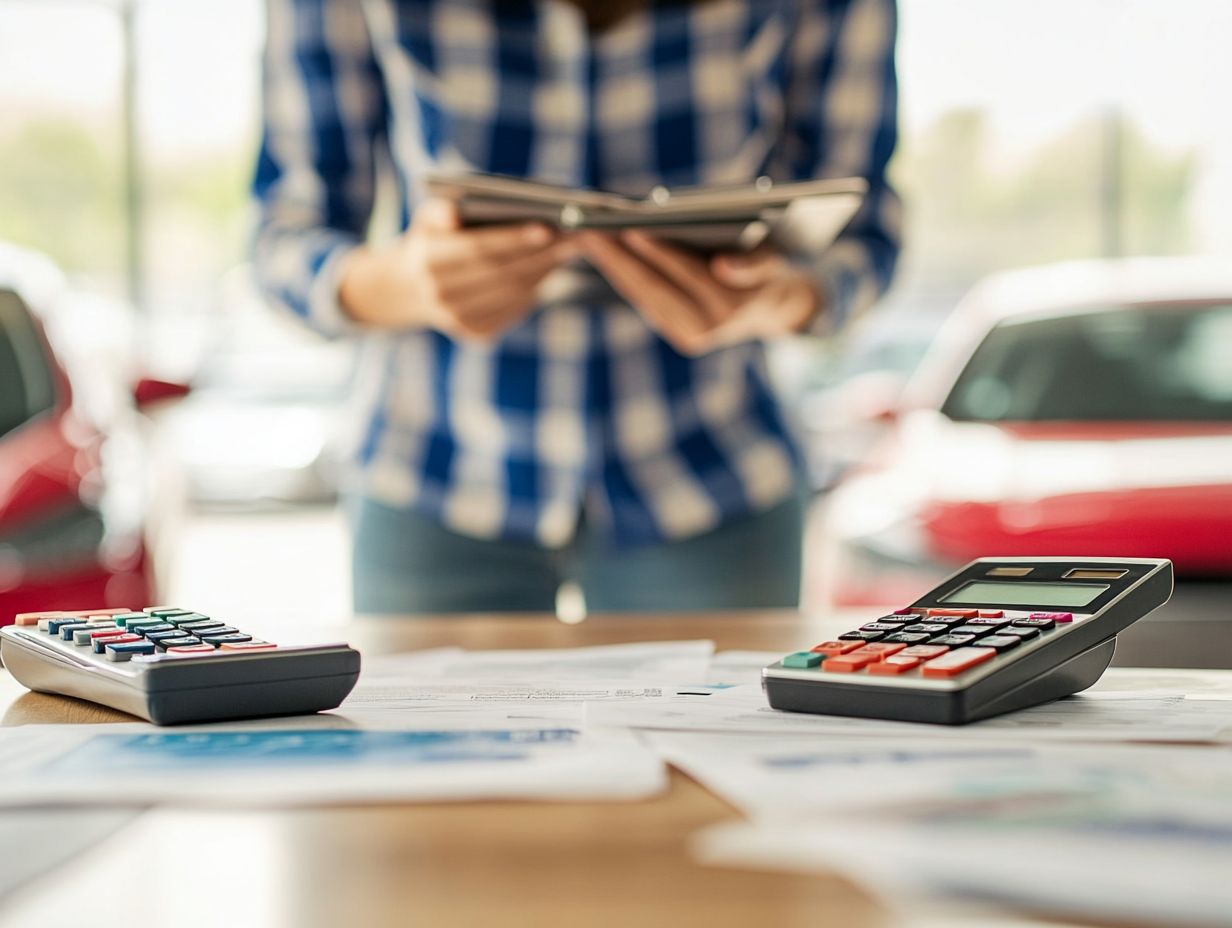
While leasing presents an array of appealing benefits, it also comes with a set of disadvantages that you should carefully consider. Specifically, the limitations of vehicle ownership and the possibility of extra charges for going over the mileage limit can significantly affect your overall costs.
Be cautious: those extra charges can add up quickly and impact your budget! These drawbacks may lead to additional financial implications when the lease term concludes, making it essential for you to fully understand the lease terms and any potential loss in value of the car involved.
When evaluating a lease, it’s crucial to factor in the restrictions on mileage. Exceeding the allowable limits can lead to hefty penalties that accumulate over time.
Unlike owning a vehicle outright, leasing means you won’t build equity. At the end of the lease, you simply return the vehicle, missing out on any ownership benefits. This lack of long-term investment might not sit well with budget-conscious individuals, particularly those who prefer the flexibility and freedom that comes with owning a car.
Various end-of-lease fees for damages or excessive wear can complicate your financial landscape. This reality underscores the importance of conducting thorough research before committing to a lease, ensuring that you make an informed decision that aligns with your financial goals.
Pros and Cons of Buying
When you’re contemplating the purchase of a vehicle, it’s essential to meticulously weigh the pros and cons. Consider the ownership benefits, such as building equity and enjoying the freedom to customize your vehicle to your liking.
This financial decision often requires you to scrutinize auto loan rates, assess the condition of the vehicle, and evaluate your overall budget. Each of these factors presents a unique set of advantages and disadvantages that differ significantly from the leasing option.
Advantages of Buying
Purchasing a vehicle offers a range of compelling advantages, not the least of which is the full ownership benefits that allow you to build equity over time. With ownership comes the freedom to customize or modify your vehicle according to your tastes, free from any restrictions.
When you buy a car, you re not only paving the way for better long-term financial outcomes think potential trade-in value and avoiding those pesky lease-end fees associated with leasing agreements but you’re also making a savvy investment decision.
Owning a vehicle means you can tailor it to your preferences, whether that s through aesthetic enhancements or performance upgrades, crafting a truly personalized driving experience. As your repayments decrease, the value of your car can appreciate, transforming it into an asset that you can leverage or sell down the line.
This ownership strategy gives you the power to not just enjoy emotional satisfaction but also have better control over your financial commitments. Ultimately, this leads to savings that can be invested elsewhere or used to finance your next adventure.
Disadvantages of Buying
While purchasing a vehicle brings a wealth of ownership benefits, it also comes with its fair share of drawbacks. Most notably, the higher monthly payments and long-term expenses can put a strain on your budget. It’s crucial to weigh the financial implications of your decision.
You should also be mindful of vehicle depreciation, which can significantly affect resale value. Explore various auto loan options to help alleviate these costs.
The financial commitment often kicks off with substantial upfront expenses. These encompass not just the purchase price, but also sales tax, registration fees, and insurance premiums. All of these can escalate quickly.
Vehicles are notorious for their rapid depreciation; they can lose 15% to 20% of their value in the first year alone. This decline can pose a serious challenge when you’re ready to sell or trade in, as you might find yourself owing more than the vehicle is worth.
Ongoing maintenance and unexpected repairs can also increase your costs. Vehicle ownership can be a big financial responsibility that requires thorough consideration.
Factors to Consider When Choosing Between Leasing and Buying
Choosing between leasing and buying a vehicle demands thoughtful consideration of several key factors. These can profoundly affect your financial decisions and personal preferences.
Think about aspects such as monthly payments, maintenance requirements, and your unique driving habits. Each option has distinct advantages, and how they align with your lifestyle and financial situation will greatly influence your choice.
Financial Considerations

When weighing the options between leasing and buying, financial considerations are absolutely crucial. Take a close look at the total cost of ownership versus the available leasing options.
Analyze factors like your monthly payments, auto loan rates, and any potential lease buyout scenarios, which means buying the car at the end of your lease.
Consider the depreciation of the vehicle, your maintenance responsibilities, and any tax implications that could play a role in your decision. Leasing often offers lower upfront costs and appeals to those who enjoy changing vehicles every few years. In contrast, buying is generally viewed as a stronger long-term investment.
By understanding the overall payment structures, including the interest rates tied to auto loans, you can clarify the long-term financial impact. This knowledge empowers you to navigate your options effectively and ensure they align with your unique financial situation.
Lifestyle and Personal Preferences
Lifestyle and personal preferences play a pivotal role in your decision to lease or buy a vehicle. Your individual driving habits and desire for ownership can greatly influence this choice.
For example, if you drive a lot for work or endure long commutes, leasing might catch your eye. It allows you to enjoy a new model every few years without the burden of long-term maintenance costs.
Conversely, if you have a strong sense of ownership, you might lean toward buying, appreciating the freedom that comes with possessing your vehicle outright.
Budget considerations are crucial here. Leasing often presents a more manageable monthly payment, while purchasing can build equity over time. For a deeper insight, check out understanding lease vs. buy for new cars. Ultimately, your unique situation will dictate your choice as you balance immediate financial considerations with long-term lifestyle aspirations.
Making the Decision: Leasing vs. Buying
Choosing between leasing and buying a vehicle demands a deep dive into the financial implications and personal preferences that each option entails. Make this decision today it can shape your financial future!
Evaluate leasing agreements and the potential for a lease buyout. Weigh budget considerations against the advantages of long-term ownership that come with purchasing a vehicle.
Assessing Your Needs and Priorities
Assessing your needs and priorities is crucial when deciding between leasing and buying. Your unique financial situation depends on factors like your driving habits, your desire for vehicle ownership, and the monthly payments you re comfortable with. Understanding the lease terms and how they align with your priorities can significantly influence your final choice.
Look at your financial situation closely; this means examining your current budget while anticipating how future expenses may impact your decisions. For example, if you expect a lot of driving or need a vehicle that can adapt to changing family dynamics, this might make you lean toward buying a car for long-term use.
Understanding the full range of costs associated with each option including insurance rates, maintenance responsibilities, and the potential for equity build-up will help you create a comprehensive budget. Taking the time to reflect on these personal factors ensures that your decision is not only financially sound but also fits with your lifestyle needs.
Watch this video for more insights!
Frequently Asked Questions
What is the difference between leasing and buying a vehicle?
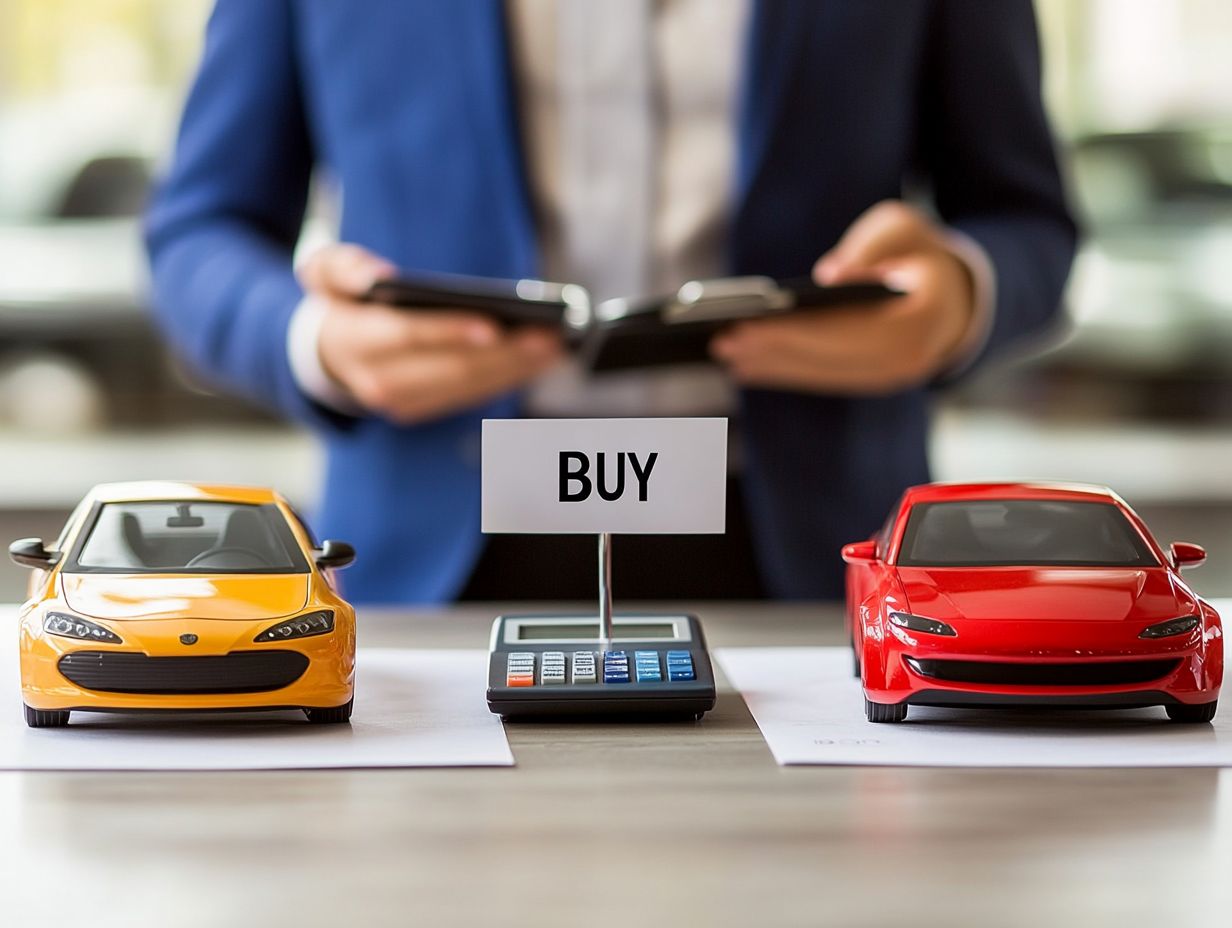
Leasing a vehicle means paying for the use of the car over a set period, while buying a vehicle means paying for ownership of the car outright.
What are the advantages of leasing a car?
Leasing a car usually requires a lower down payment and monthly payments compared to buying. It also allows you to drive a new car every few years.
What are the benefits of buying a car?
When you buy a car, you have the freedom to customize and modify it to your liking. You also have the option to sell it whenever you want.
How do I determine if leasing or buying is the right option for me?
Consider your budget, driving habits, and how long you plan to keep the car. Leasing may be better for those who want a new car every few years, while buying may suit those who prefer long-term ownership.
Are there any additional costs associated with leasing or buying a car?
Aside from the down payment and monthly payments, leasing usually requires a security deposit and may have mileage restrictions. When buying, you might have to pay for maintenance and repairs.
Can I negotiate the terms of a lease or purchase?
Yes, you can negotiate the terms of both a lease and a purchase. This includes the price, interest rate, and any additional fees. It’s important to do your research and be prepared to negotiate before signing any contracts.
Take the time to consider what works best for you!

